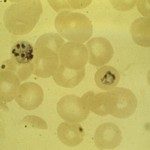Link to Pubmed [PMID] – 38104024
Link to DOI – 10.1016/j.pt.2023.11.007
Trends Parasitol 2024 Feb; 40(2): 118-130
Malaria is a life-threatening tropical disease caused by parasites of the genus Plasmodium, of which Plasmodium falciparum is the most lethal. Malaria parasites have a complex life cycle, with stages occurring in both the Anopheles mosquito vector and human host. Ring stages are the youngest form of the parasite in the intraerythrocytic developmental cycle and are associated with evasion of spleen clearance, temporary growth arrest (TGA), and drug resistance. This formidable ability to survive and develop into mature, sexual, or growth-arrested forms demonstrates the inherent population heterogeneity. Here we highlight the role of the ring stage as a crossroads in parasite development and as a reservoir of surviving cells in the human host via TGA survival mechanisms.

